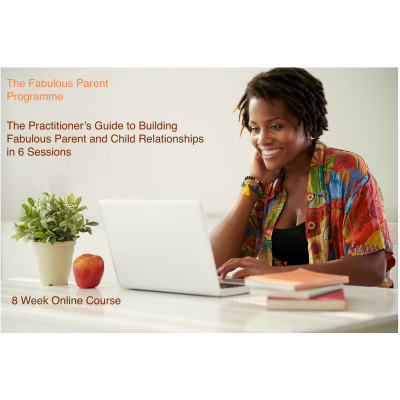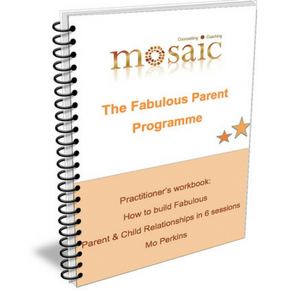As a therapist or coach you’ll often find yourself supporting adults at different points on the mental health spectrum. When the person suffering mental distress is a parent the impact can be far reaching. It’s challenging to meet your own needs when you’re feeling emotionally and psychologically depleted and when you’re caring for a child the situation can seem magnified.
How would you define mental health? Mental health is a term that applies to all of us but is often used in association with mental distress. I believe there’s a continuum from mental health to mental illness and any of us could find ourselves at any point along that continuum at any time.
I like this definition of mental health from the World Health Organisation
“ Mental health is defined as a state of well-being in which every individual realises his or her own potential, can cope with the normal stresses of life, can work productively and fruitfully, and is able to contribute to her or his community”
According to the Health Education service between 1 in 4 and 1 in 5 adults have mental health issues. 25 % of those people are parents. That means in a class of 30 children there could easily be 4 or 5 living with a family member with mental health problems (2016)
5 ways that parental mental health affects children.
1. Parental mental health can affect a child’s social development.
It’s a real challenge for kids when their parents are suffering from anxiety, depression or other mental illnesses. Not all mental illness is diagnosed but either way it impacts the whole family. Children are particularly vulnerable because they don’t understand what’s going on and often blame themselves for a parent’s behaviour. They don’t know being tired all the time, more tearful or irritable is a symptom of their parent’s illness. This can lead to low self-esteem in children and lack of self worth. Children whose parents have mental health issues often feel isolated, worried and confused. They often lose the carefree nature that’s part and parcel of being a child. Friends might asked them to play but joining in feels overwhelming or they know their parent just won’t feel well enough to take them out to meet friends. After a while friends stop asking and this leads to further feelings of social isolation and a lack of engagement with their peers. When we notice that a child seems older than their years or that academic progress is delayed, or they’re reluctant to engage withother children, parental mental health could be a factor.
2. Parents with mental health issues may need their kids to become carers
Children living with parents with mental health problems often become carers to their parent or younger siblings. This becomes even more of a problem if they’re living in a single parent household. They may find that they’re cooking meals, cleaning, dressing and washing younger siblings or even undertaking personal care for their parent. Of course there’s nothing wrong with children having age appropriate chores and learning to develop their caring strengths and qualities but mental illness doesn’t always wait until a child is old enough to cope. Things need to be done right now whether the child is fully able to cope or undertake tasks safely. If children come to the notice of caring organisations and become identified as young carers they can get the right amount of support but there will be many kids who don’t quite get identified as young carers but nonetheless are helping out on a regular basis. Be aware of children who look uncared for, are regularly late for school or seem very tired.
3. Children whose parents have mental health issues can have long-term problems.
There’s evidence to suggest that when parents have mental health issues the risk of a child developing long-term problems is increased. Children’s emotional development is closely interwoven with the interpersonal relationships they have within their family and their need for nurturing and secure attachments. Parent’s mental health issues compromise these factors creating attachment issues that follow children into later life.
It’s also known that when a parent has mental health issues it can affect the child’s ability to parent in later years. A part of our parenting style is learned behaviour, therefore, sometimes dysfunctional ways of parenting are internalized and unhelpful patterns are repeated with the next generation. Until kids get older and have wider experience what ever happens at home seems completely normal because there’s nothing to compare it to. When children living with mental ill health are identified early and receive support they become more resilient and less likely to have long-term issues.
4. Parental mental health issues affect a child’s behaviour
Kids display challenging behaviour as a way of expressing their emotional needs and as a way of trying to meet those needs. When parents have serious mental health problems they aren’t always able to respond and show appropriate attunement to their children. Unfortunately, it can create a vicious cycle where children escalate their behaviour but this causes more distress to parents resulting in parents withdrawing or feeling resentful towards their kids. Challenging behaviour can include school refusal, self-harm or the child being withdrawn or aggressive. Be aware that challenging behaviour might be at home or at school. It’s not always displayed in all situations. Some children try to protect their parents by being compliant at home but when they get to school they feel able to show their frustration.
5. Parental mental health issues affect a child’s emotions
There’s a close connection between a child’s behaviour and their emotions. The behaviour is what we see and the emotions are what the child is struggling with inside and can’t find the words to express. All of the previous points have an impact on how children feel. Some affects of parental mental health can be seen but emotional struggles just like mental illness can be difficult to spot. In some ways challenging behaviour alerts us to there being something wrong for the child. It’s not always as easy to tell that a child is scared that they might be taken away or that they feel the pressure of keeping a parent’s mental illness a secret. It’s common for children in this situation to feel worried, embarrassed, angry, abandoned and many more difficult emotions.
What can practitioner’s working with children and parents do?
Be aware that children and families face numerous challenges. Mental health is just one of the adverse childhood experiences to take into consideration. Parenting is more difficult when mental illness is a problem but it’s not impossible and many parents with mental health issues do an excellent job and raise happy and resilient children. However, it helps if we’re aware of the impact of mental health issues and raise the awareness of other professionals that we work with. If parental mental health is brought to our attention we can be ready to talk to children about their concerns, provide age appropriate information and be alert to safeguarding issues. Specific techniques like sand tray therapy, therapeutic stories and drawing are also great ways to help a child express itself even when they can’t find the right words.
What can schools do to help?
Schools are a central part of the community and it’s common for parents to be invited in for various initiatives like ‘bring your parent to school’ days. Therefore, schools could help by having mental health awareness sessions and information on school websites about how parents and children can access support and who to talk to. Cultural issues and norms need to be taken into account too so minority groups don’t get judged based on the norms and customs of the majority culture. Often when people are ill they have an even greater need to access services in their own language and speak to people who they feel understand them. It’s really helpful if schools and professionals build this into the system when offering support.
What else can help?
It’s helpful to be aware of the support that’s provided by other agencies. Schools are often very aware of what’s available in the community and as therapists and coaches we might be asked to be involved in running mindfulness classes or anger management groups or working with groups of children who have a family member with mental health problems. Remember, there’s a lot of useful information on the Internet now for people to access without having to leave home or find childcare.
You may also be interested in taking a look at the The Fabulous Parent Programme: The Practitioner’s Guide to Building Fabulous Parent & Child Relationships in 6 sessions. It’s a gentle approach to coaching parents to repair, renew and develop the bond with their child by spending quality time and taking care of themselves. It’s a great programme to use with parents with Mental Health issues because it gives a step-by-step approach and guides parents with specific techniques to spend a fabulous 30 minutes once a week with their child. You can find out more here






Great article Mo. Very useful when reflecting on my work with clients who are parents, and those who were children of parents with mental health issues.
Thanks.
Thanks for your feedback Steve. I agree with you it’s relevant whether we’re working with adults or children and even when there isn’t a diagnosed condition.